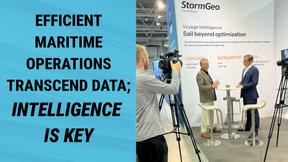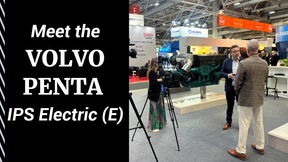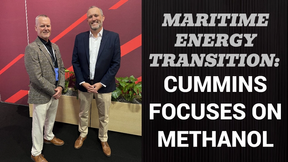Fuel For Thought
There are three issues that receive the lion's share of attention in the bunker industry worldwide: bunkering procedures; bunker contracts; and the inclusion of used automobile fuel in bunkers. However, there is a fourth and much more important issue — the basic lack of education, training and understanding — that is not receiving nearly enough attention. Of course there are other side issues too, such as the need for universally agreed upon standard procedures and standard contracts, as well as the never-ending quest for top quality of fuel. But the should not overlook the overall need for better education and training in the bunker industry. Many of the problems in bunkering are due to a fundamental lack of understanding, either of the product or the supply process. In the past, shipowners bought their bunker oil on contract from regular suppliers, usually oil majors. Although bunkering seemed easy then, it was not and still is not. Today's bunker market is a highly fragmented, specialized market with plenty of pitfalls to trip up the uninitiated. Traders, oil majors, brokers, independent suppliers and barge operators all form part of an increasingly sophisticated worldwide industry estimated at a 120 million tonsannually. It has become a market where wise buyers can save money and save problems. It is also a market where buyers — with less understanding — can find themselves facing problems which cost them a lot more than the savings of the few dollars per ton they thought they were making.
A large part of the problem stems from shipowners which expect their operational personnel to make major purchasing decisions for bunkers. Bunkers account for more than 50 percent of a ship's running costs, yet many bunker buyers are not specialists, and can only pay so much attention to the bunker business. Too many owners seem reluctant to invest in even minimal training for those staff who order bunkers. The result is that too many buyers of bunkers have too little knowledge of the business, too little experience and too little authority within their organizations. Owners shouldpercentknow that an investment in training bunker purchasing staff will pay off handsomely, not only in terms of cheaper fuel, but in terms of less lost time and fewer problems. To monitor the fuel delivered on board and to ensure that it meets the required specifications, samples are taken and analyzed. But problems have arisen over how and where fuel samples should be taken. An ISO working group on bunker sampling has been struggling to sort this out, but has been driven toward the lowest common denominator, which is taking a sample from the tanks of the bunker barges that deliver the fuel. Unfortunately, a quick dip in the tanks does not give a complete picture. Oil's constituent components layer themselves in tanks according to weight and the sample taken from the top may not tally with what lies deeper down. What the industry really needs is a strong agreement on the need for a standard sampling procedure that will siphon off a representative portion of the fuel as it isbuyer's ship. It is only this way that both parties can be sure that the sample is representative of the delivery. Until such an arrangement is in place, and ships and physical suppliers have the right equipment, disputes over bunker quality will continue to dog the market.
Regional Initiatives Pave Path The Dutch suppliers union, NOVE, has developed a standard protocol which was launched last year to much acclaim around the world. The Singapore Standard Bunkering procedure is now a few years old and is seen by many in the industry as a sound platform on which to build.
The question of a standard contract for bunker sale and purchase was put firmly on the agenda by Baltic and International Maritime Council (BIMCO) in 1995. It developed a standard contract, FUELCON, but it has hardly been adopted by the bunker buying community, and the selling side of the business appears, with one exception so far, to have rejected it. However, BIMCO has stimulated debate about the way bunkers are bought and sold, and more importantly, about the right forum and bodies for sorting out the problems. Shipping people not directly involved in the bunker industry often get the impression that there are endless disputes over quality and quantity of oil supplied, but these problems are blown out of proportion. In real terms, the great majority of oil supplied is satisfactory, and much of the bunker industry functions with a degree of mutual trust which is rare in other industries.
In many cases the problem arises because of a lack of understanding of the relationship between buyers and sellers, the nature of the people who are trading and broking bunkers, and above all, a lack of understanding of how specifications and bunkering actually works. Some investment by all parties in simple training would prevent a lot of disputes arising. Traces of used auto lube oil in bunkers is an example of a difficult topic. There has been a recent high profile dispute, following legal action in the U.S. between a shipowner and supplier. The important point behind this debate is that it is a question of degree rather than a question of absolutes. Most people would readily agree that a large percentage of used lube oil in bunker fuel would make it unusable, but the problem arises over minute quantities. It is easy to see the way out of a problem if the oil is bought against a standard specification, and it fails to meet it by a wide margin. However, this is very rare, and in practical terms, most oil is either within spec, or still useable when slightly off spec. Or it may be so close to the spec that the repeatability of tests will not allow you to know for sure if it is on spec or off spec.
So when oil is not quite what you asked for, how do you sort the problem out? ISO standard 8217:1996 (E) - which governs fuel quality - is a good standard, but it is not absolute, because there are simply too many variables in sampling and testing. Samples and tests of the same fuel conducted under different circumstances may well return results well within the specification in some instances and outside the spec in others. The pressures to ditch non-conforming fuel are high, regardless of how little the variation may be. If your tests show aluminum content is one part per million over the spec, should the ship debunker? Common sense would provide a solution to many disputes. But it too often happens that parties resort to litigation. The fuel testing bodies, such as DNV and FOBAS, can from time to time confuse the issue as well. They take a different approach to the advice they give to shipowners for off-spec fuel. They argue between themselves over the correct way of dealing with a suspect load of bunkers. And to muddle matters further, shipowners want simple answers to a complex question. IBIA feels that more education and training would help owners and suppliers to put bunker disputes in perspective, and to avoid many of them in the first place. The International Bunker Industry Association (IBIA) is determined to tackle this problem of education. It is assisting with existing bunker courses and seminars, and also running its own introductory courses for both buyers and suppliers of bunkers. This is not a purely selfish undertaking to improve standards within the industry. It has a bearing outside bunkering too. With an estimated 98 percent of global trade carried by sea, the importance of buying the right bunkers deserves a higher profile than it currently enjoys. After all, no fuel, no ships ... no trade. But until shipowners and suppliers realize that cutting corners while purchasing bunkers can result in costly delays, little will change. Shipowners need to be made aware of the importance of education. In the case of bunkering, knowledge is purchasing power.
Antonio Cosulich was elected as the second chairman of the International Bunker Industry Association in 1996. He is currently managing director of Genoabased Fratelli Cosulich.
The International Bunker Industry Association (IBIA) represents the marine fuel industry worldwide and currently has just under 400 members. Housed at The Baltic Exchange in London, it works to create a better understanding of marine fuel issues through lobbying, conferences, courses and guidebooks. IBIA can be contacted at: The Baltic Exchange, St. Mary Axe, London EC3A 8BH, UK. Tel: +44 171 929 1616, Fax: +44 171 929 1717.







